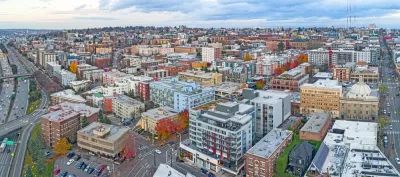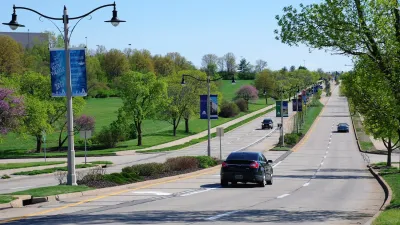A law that limits how much parking cities can require for residential amd commercial developments could lead to a construction boom.

Washington State’s recent parking reform law could have a major impact on the state’s housing crisis, writes Kea Wilson in Streetsblog USA.
Parking requirements are frequently blamed for driving up the cost of housing construction and limiting the potential for density. The new law bars cities from requiring more than one parking spot per two residential units or one spot per detached single-family home. “Some building types are even held exempt from all parking requirements, including affordable and senior housing complexes where fewer residents drive, daycare centers that struggle to make ends meet even without an ocean of asphalt to build and maintain, and any residence under 1,200 square feet — a category which includes most apartments in dense areas like Seattle.”
The new law will also help the state streamline building codes that create arbitrary parking minimums for various businesses and other types of buildings. “Proponents of the bill say those subtle moves could have a seismic impact on Washington's housing and commercial landscape, allowing builders to unlock countless acres of previously undevelopable land that legally had to be devoted to asphalt — even if the structures those spaces serve were initially built in the days when parking minimums were lower.”
Parking reform could offer both short-term relief for renters and a long-term shift toward less auto-centric communities. According to Catie Gould, a researcher for Sightline, “[Parking reform] allows the market to build what they think is common sense, instead of having these predetermined rules that were set by the government who knows how many decades ago.”
FULL STORY: This Parking Bill Could Help Solve the Housing Crisis

Planetizen Federal Action Tracker
A weekly monitor of how Trump’s orders and actions are impacting planners and planning in America.

USGS Water Science Centers Targeted for Closure
If their work is suspended, states could lose a valuable resource for monitoring, understanding, and managing water resources.

End Human Sacrifices to the Demanding Gods of Automobile Dependency and Sprawl
The U.S. has much higher traffic fatality rates than peer countries due to automobile dependency and sprawl. Better planning can reduce these human sacrifices.

Trump: Federal Government Won’t Pay for California HSR
The President has targeted federal funding for the California bullet train project since his first administration.

San Francisco Enhances Urban Planning Initiatives with Green Infrastructure
San Francisco incorporates green infrastructure in its city development initiatives, elevating the importance of sustainability in urban planning.

Chicago Approves Green Affordable Housing Plan
The Mayor’s plan calls for creating a nonprofit housing corporation tasked with building affordable housing that meets Green Building standards.
Urban Design for Planners 1: Software Tools
This six-course series explores essential urban design concepts using open source software and equips planners with the tools they need to participate fully in the urban design process.
Planning for Universal Design
Learn the tools for implementing Universal Design in planning regulations.
Tyler Technologies
New York City School Construction Authority
Village of Glen Ellyn
Transportation Research & Education Center (TREC) at Portland State University
Chaddick Institute at DePaul University
Institute for Housing and Urban Development Studies (IHS)
Regional Transportation Commission of Southern Nevada
Toledo-Lucas County Plan Commissions





























